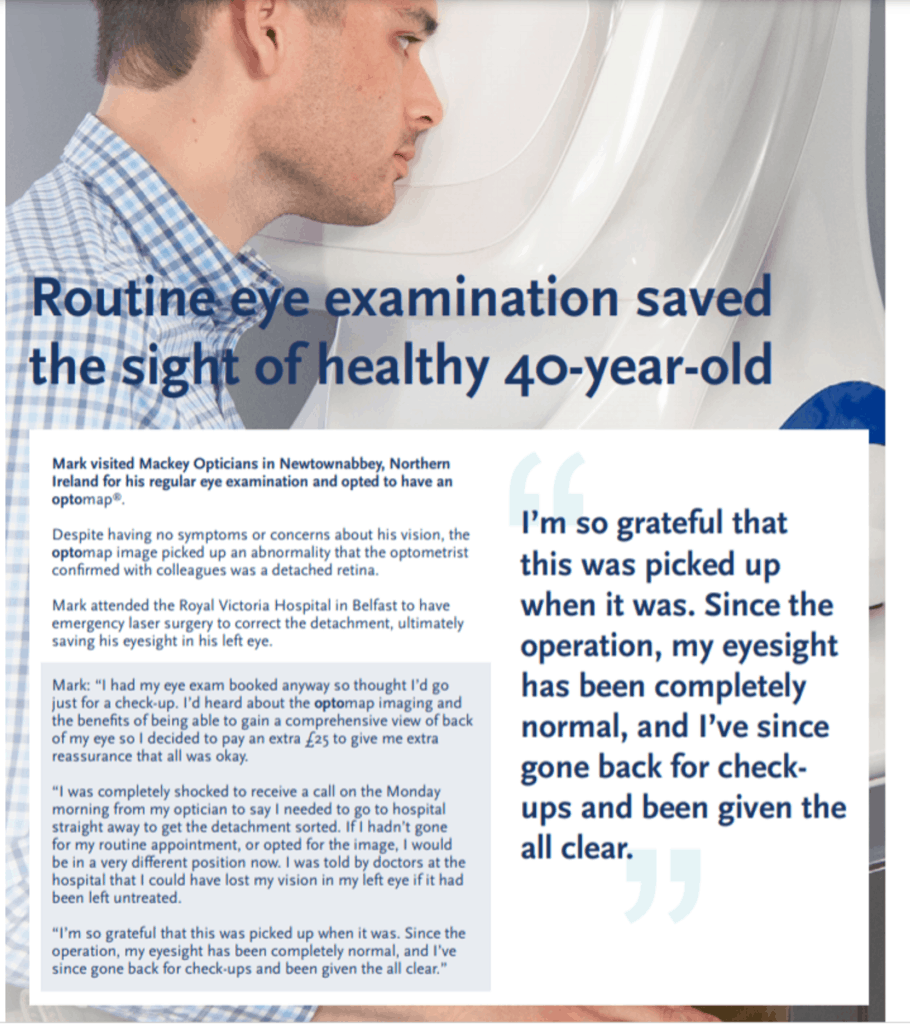ADVANCED RETINAL IMAGING TECHNOLOGY: OPTOS RESEARCH REPORT 2021
The demand for advanced retinal imaging technology (Optos) is firmly in focus for patients as they reveal their attitudes to eye health and expectations of eye examinations.
At Optos, their aim is to provide technology to help eye care practitioners provide the best possible care for their patients. As specialists in the design and manufacture of the only ultra-widefield retinal (UWFTM) imaging technology, they set out to gain insight into what patients want from their eye examinations and their attitudes towards eye health. They surveyed 2,538 UK adults to identify what they find most valuable when going for an eye examination. Optometrists and their patients have contributed real-life examples of why an optomap® exam can be life changing for everyone concerned. The results of this survey highlight what patients said they want from their eye care professional and demonstrate the potential role of UWF retinal imaging in meeting their expectations to help protect the eyesight and overall health of our patients and provide them with exactly what they are looking for even more effectively than before.

Attending eye appointments remains a priority for many UK adults, with three-quarters (75%) having been for an exam within the last three years. However, it’s patients’ expectations of those appointments and what they value most highly from them that form some of the more enlightening insights from these survey findings.
When asked what they would value the most from their regular appointment, beside expert advice (45%), respondents chose advanced technology (58%) as their top priority. Whereas, costbased factors such as inexpensive glasses or contact lenses proved less of a priority, cited by under a third (30%). This data suggests that eye care professionals, who focus on the expertise they provide and quality of service, may be more attractive to current and potential patients.

Understanding of eye disease and examinations
The survey findings on patients’ knowledge of eye disease shows a mixed picture of understanding. Reassuringly significant numbers of respondents were aware certain diseases, such as diabetes, can be found during an eye exam, however this knowledge level reduces in younger age groups. It is encouraging that people in the survey considered optometrists to be the authority on eye health over other medical professionals.
Visibility of the retina
When asked about how much of their retina the optometrist sees during a basic examination, on average, respondents believed that a basic exam shows more than two thirds (68%) of the retina. The results also detailed that when educated about advanced retinal imaging, respondents were interested to learn that optomap has the potential to show up to 82% of the retina in a single non-dilated capture, compared to a standard fundus image which shows 15% of the retina.
There is mounting evidence that findings in the peripheral retina positively impact detection and treatment of diseases such as diabetic retinopathy, age-related macular degeneration, detachments, and uveitis. Findings in the far periphery of the retina are also becoming increasingly important in identifying patients at highest risk for severe disease and vision loss. Increasing understanding of the capabilities of different imaging techniques will help ensure patients can make informed decisions for their eye care.

One of the most encouraging outcomes from the survey is how much value people place on their eye health and their recognition of the importance of using advanced imaging technology to protect it. Significantly, the findings also demonstrate that patients are willing to pay more for advanced imaging such as an optomap, with two-thirds (66%) of those surveyed agreeing.

The survey found that the most important reason respondents gave for their willingness to pay more for an eye exam was because of the value they place on their overall eye health. Three-fifths (59%) said the reassurance that potential issues can be found early in a comprehensive eye exam was also a key factor.

It is positive to see that early detection is valued so highly as it is one of the key differentiators and benefits of ultra-widefield imaging. For example, optomap is the only retinal imaging technology in the world that can give a 200° view of the retina in a single capture. The imaging technology provides optometrists and ophthalmologists with a bigger picture and more clinical information, facilitating the early detection, management and effective treatment of disorders and diseases evidenced in the retina. These include retinal detachments and tears, glaucoma, diabetic retinopathy, and age-related macular degeneration. Using technology that helps to easily and effectively capture any of these potential issues as early as possible not only gives patients and eye care professionals more reassurance, but it can have a significant impact on protecting patients’ vision in the long term.
For more information on Optomap, or to book an appointment please phone us on 0115 9332999.
We are always here to help.


